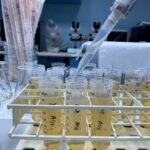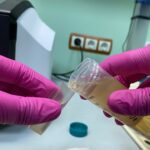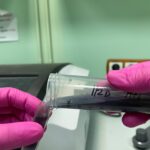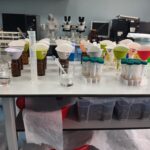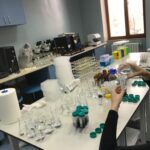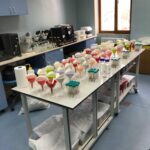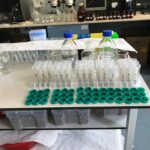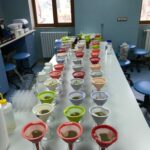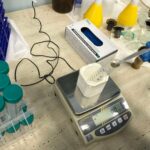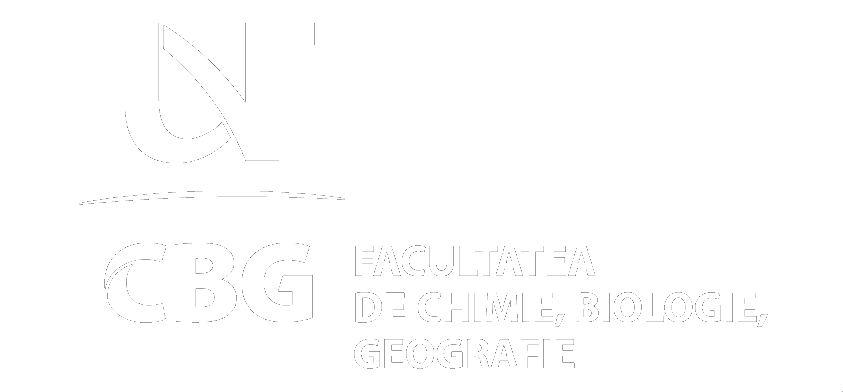TRIAZOLE - Evaluarea efectelor asupra mediului înconjurător ale fungicidelor triazolice care sunt aprobate pentru utilizare în Uniunea Europeană pentru protecția cerealelor
ACRONIM: TRIAZOLE
PROJECT TITLE: Evaluarea efectelor asupra mediului înconjurător ale fungicidelor triazolice care sunt aprobate pentru utilizare în Uniunea Europeană pentru protecția cerealelor/Assessment of the environmental effects of triazole fungicides that are approved for use in European Union for the protection of cereals
PROJECT CODE: PN-III-P1-1.1-PD-2019-0255
PERIOD OF IMPLENTATION: September 01, 2020 – August 08, 2022
PROJECT
This project focusses to triazole fungicides that are approved to be used in European Union for protecting cereals: cyproconazole, epoxiconazole, flutriafol, metconazole, paclobutrazole, tebuconazole, tetraconazole, triadimenol and triticonazole. Both experimental and computational approaches will be used to assess the effects of these fungicides on the model organisms from water and soil (organisms that are widely used to assess the environmental impact of xenobiotics) and a special focus will be addressed on their effects on the soil population of microorganisms and the activities of enzymes found in soil. This class of chemicals is considered in this project because the demand for cereals within the EU is expected to rise by 21% in the next years and new and emerging infectious crop diseases can represent a real threat to agricultural productivity. Triazole fungicides represent a vital component of modern agriculture, as part of a diversified mix that helps protect crops and European food supplies. While the use of triazole fungicides may be associated with a certain level of risk, a sensible and pragmatic interpretation of EU regulations added to a comprehensive information concerning their environmental hazard could ensure that they can continue to be used safely, helping to guarantee a supply of healthy and affordable food, while complying with the highest degree of environment protection.
The overall objective of this project is to obtain comprehensive information concerning the environmental effects of triazole fungicides that are approved to be used in the European Union for protecting cereals. The specific objectives of this project are:
O1. Assessment of the effects of triazole fungicides that are approved to be used in the European Union for protecting cereals on the model organisms from water, air, and soil.
O2. Evaluation of the effects of triazole fungicides that are approved to be used in the European Union for protecting cereals on the soil population of microorganisms and the activity of enzymes found in soil.
O3. Dissemination of the project outcomes concerning the safely use of triazole fungicides to scientists, students, pupils, and population.
O4. Improvement of the research and dissemination skills and development of an independent professional research career for the applicant.
A1. Assessment of the effects of triazole fungicides on the model organisms from water and soil
A2. Evaluation of the effects of triazole fungicides soil population of microorganisms
A3. Evaluation of the effects of triazole fungicides on the activity of enzymes found in soil
A4. Project management


RESULTS DURING THE ENTIRE PERIOD OF THE PROJECT IMPLEMENTATION
STAGE I
During the first stage, computational predictions were made regarding the effects of triazole fungicides on model organisms in water, air and soil. Also, was made the technical-scientific and financial report for this stage. The results were communicated during the 12th edition of the Annual Conference Biology, Biological Processes – theoretical aspects and practical applications, June 26, 2020, Timisoara.
STAGE II
This stage involved experimental studies concerning the assessment on the effects of triazole fungicides on the activity of enzymes found in soil and on soil population of microorganisms. The results obtained in the scientific activities has been communicated at 3 national conferences, 4 international conferences and 1 scientific paper was published in an WOS Q1 journal. There were 3 students that performed their bachelor thesis in the cadre of this project.
STAGE III
This stage involved experimental studies concerning the assessment on the effects of triazole fungicides on the activity of enzymes found in soil and on soil population of microorganisms. The results obtained in the scientific activities has been communicated at 2 national conferences, 1 international conference and 2 scientific papers was published, WOS Q1 journal (1) and WOS Q3 journal (1). Also, was submitted a manuscript for publication in an Q1 journal. There were 7 students that performed their bachelor and master thesis in the cadre of this project.
NATIONAL COMMUNICATIONS DURING THE ENTIRE PERIOD OF THE PROJECT IMPLEMENTATION
- Diana Larisa ROMAN, Denisa Ioana VOICULESCU, Marioara Nicoleta FILIMON, Vasile OSTAFE, Adriana ISVORAN, The effects of the fungicide tebuconazole on the activity of several enzymes found in soil: preliminary results, Student Scientific Session at Faculty of Food Engineering tourism and environmental protection „Aurel Vlaicu”, University of Arad, XIXth edition, November 25 – 26, 2021, Arad, Romania (on-line)
- Diana Larisa ROMAN, Alexandra BURTĂ, Đurđina MIRIĆ, Adriana ISVORAN, An in silico approach in order to predict the possible effects of some triazole fungicides on model organisms, USAMVB Timisoara Multidisciplinary Conference on Sustainable Development, May 20-21, 2021, Timișoara, Romania (on-line)
- Andrijana PUJICIĆ, Diana – Larisa ROMAN, Studiul computațional al aspectelor structurale ale unor enzime utilizate ca indicatori de calitate a solului, 13th edition of the Annual Conference Biology, Biological Processes – theoretical aspects and practical applications, July 7, 2021, Timisoara, Romania (on-line)
- Marija KARABAŠEVIĆ, Diana-Larisa ROMAN, Estimarea interacțiunii ciproconazolului cu enzime provenite de la microorganisme din sol utilizând metode computaționale, 13th edition of the Annual Conference Biology, Biological Processes – theoretical aspects and practical applications, July 7, 2021, Timisoara, Romania (on-line)
- Đurđina MIRIĆ, Diana-Larisa ROMAN, Evaluarea computațională a efectelor unor fungicide triazolice asupra unor organisme model din mediu înconjurător, 13th edition of the Annual Conference Biology, Biological Processes – theoretical aspects and practical applications, July 7, 2021, Timisoara, Romania (on-line)
- Adriana-Paulina ȘCHEIEANU, Diana Larisa ROMAN, Evaluarea efectelor fungicidului triazolic miclobutanil cu enzime prezente în sol, 14th edition of the Annual Conference Biology, Biological Processes – theoretical aspects and practical applications, July 4, 2022, Timisoara, Romania
- Gabriela CRISTOCEA, Bianca Vanesa BOROS, Diana Larisa ROMAN, Efectele unor fungicide triazolice asupra unor parametri biochimici la Lemna minor, 14th edition of the Annual Conference Biology, Biological Processes – theoretical aspects and practical applications, July 4, 2022, Timisoara, Romania
- Enikő – Mária DODE, Bianca-Vanesa BOROS, Diana – Larisa ROMAN, Ecotoxicitatea unor fungicide triazolice asupra lintiței (Lemna minor). Studiu de caz: Efectele flutriafolului și miclobutanilului, 14th edition of the Annual Conference Biology, Biological Processes – theoretical aspects and practical applications, July 4, 2022, Timisoara, Romania
- Francisca COPAN, Bianca Vanesa BOROS, Diana Larisa ROMAN, Evaluarea efectului unor fungicide triazolice asupra lintiței. Studiu de caz: tebuconazol și metconazol, 14th edition of the Annual Conference Biology, Biological Processes – theoretical aspects and practical applications, July 4, 2022, Timisoara, Romania
- Iulia – Adelina BUNDURUȘ, Diana – Larisa ROMAN, O abordare computațională privind evaluarea interacțiunii fungicidului miclobutanil cu enzime provenite de la microorganisme din sol, 14th edition of the Annual Conference Biology, Biological Processes – theoretical aspects and practical applications, July 4, 2022, Timisoara, Romania
- Ruxandra Mihaela CIAGLÎC, Diana – Larisa ROMAN, Evaluarea computațională a interacțiunii fungicidului metconazol cu enzime prezente în sol, 14th edition of the Annual Conference Biology, Biological Processes – theoretical aspects and practical applications, July 4, 2022, Timisoara, Romania
- Diana Larisa ROMAN, Denisa Ioana VOICULESCU, Adina MATICA, Victor BAERLE, Nicoleta FILIMON, Vasile OSTAFE, Adriana ISVORAN, Estimation of the effects of triticonazole on soil enzymatic activity, 17th National Biophysics Conference with International Participation (17-a Conferință Națională de Biofizică cu participare internațională (CNB 2022)), September 23-25, 2022, Târgu Mureș, Romania
- Denisa Ioana VOICULESCU, Diana Larisa ROMAN, Vasile OSTAFE, Adriana ISVORAN, Computational assessment of the human health effects of the stereoisomers of difenoconazole, 17th National Biophysics Conference with International Participation (17-a Conferință Națională de Biofizică cu participare internațională (CNB 2022)), September 23-25, 2022, Târgu Mureș, Romania
INTERNATIONAL COMMUNICATIONS DURING THE ENTIRE PERIOD OF THE PROJECT IMPLEMENTATION
- Diana Larisa ROMAN, Alexandra BURTĂ, Đurđina MIRIĆ, Adriana ISVORAN, A computational approach to predict the possible effects of some triazole fungicides on nontarget organisms, 9th International Online Conference Tourism And Sustainable Development, 16-17 April 2021, Timișoara, Romania
- Diana Larisa Roman, Denisa Ioana Voiculescu, Alecu Ciorsac, Vasile Ostafe, Adriana Isvoran, Molecular modeling of cyproconazole interaction with soil dehydrogenase, International Scientific Events 9th International Conference Ecology & Safety, 16-19 August 2021, Burgas, Bulgaria
- Diana Larisa ROMAN, Alexandra BURTĂ, Đurđina MIRIĆ, Adriana ISVORAN, Predictions of possible effects of some triazole fungicides on nontarget organisms, International Scientific Events 9th International Conference Agriculture & Food, 16-19 August 2021, Burgas, Bulgaria
- Alexandra-Maria BURTA, Diana Larisa ROMAN, Adriana ISVORAN, A computational assessment of the possible non-target effects of some triazole fungicides, RosNET Conference, Environmental pollution and remediation solutions with international participation, 3 September 2021, Timisoara, Romania
- Andrijana PUJICIĆ, Diana Larisa ROMAN, Adriana ISVORAN, Assesment of the structural aspects of some enzymes used as indicators of soil quality, RosNET Conference, Environmental pollution and remediation solutions with international participation, 3 September 2021, Timisoara, Romania
- Đurđina MIRIĆ, Diana Larisa ROMAN, Adriana ISVORAN, Prediction of the eco-toxicity of some triazole fungicides, RosNET Conference, Environmental pollution and remediation solutions with international participation, 3 September 2021, Timisoara, Romania
- Marija KARABAŠEVIĆ, Diana Larisa ROMAN, Adriana ISVORAN, A molecular docking study of the interaction of cyproconazole with some soil enzymes, RosNET Conference, Environmental pollution and remediation solutions with international participation, 3 September 2021, Timisoara, Romania
- Denisa Ioana VOICULESCU, Diana Larisa ROMAN, Vasile OSTAFE, Adriana ISVORAN, Effects of triazole fungicides on microorgansims found in soil, RosNET Conference, Environmental pollution and remediation solutions with international participation, 3 September 2021, Timisoara, Romania
- Diana Larisa Roman, Denisa Ioana Voiculescu, Alecu Ciorsac, Marin Roman, Vasile Ostafe, Adriana Isvoran, Assessment of the interactions of triazole fungicides with soil dehydrogenase. A molecular docking study, International Scientific Events 10th International Conference Ecology and Safety, 16-19 August 2022, Burgas, Bulgaria
- Diana Larisa Roman, Mariana Adina Matica, Iulia Bunduruș, Adriana Șcheieanu, Marioara Nicoleta Filimon, Adriana Isvoran, Assessment of the effects of the fungicide myclobutanil on the soil environment, 14 th Edition of symposium with international participation – New trends and strategies in the chemistry of advanced materials with relevance in biological systems, technique and environmental protection, 20-21 October 2022, Timisoara, Romania
- Denisa Ioana Voiculescu, Diana Larisa Roman, Vasile Ostafe, Adriana Isvoran, Computational assessment of the toxicological effects of the myclobutanil on the human health, 14 th Edition of symposium with international participation – New trends and strategies in the chemistry of advanced materials with relevance in biological systems, technique and environmental protection, 20-21 October 2022, Timisoara, Romania
ARTICLES DURING THE ENTIRE PERIOD OF THE PROJECT IMPLEMENTATION
- L. ROMAN, D. I. VOICULESCU, M. FILIP, V. OSTAFE, A. ISVORAN, Effects of triazole fungicides on soil microbiota and on the activities of enzymes found in soil: a review, Agriculture, 11:893, 2021, IF: 2,925, DOI: 10.3390/agriculture11090893, Q1.
- L. ROMAN, D. I. VOICULESCU, V. OSTAFE, A. CIORSAC, A. ISVORAN, A review of the toxicity of triazole fungicides approved to be used in European Union to the soil and aqueous environment, Ovidius University Annals of Chemistry 33(2), 113-120, 2022, Q3.
- I. VOICULESCU, D. L. ROMAN, V. OSTAFE, A. ISVORAN, A cheminformatics study regarding the human health risks assessment of the stereoisomers of difenoconazole, Molecules, 27: 4682, 2022, IF: 4,927, DOI: 10.3390/molecules27154682, Q1.
- L. ROMAN, D. I. VOICULESCU, M. A. MATICA, V. BAERLE, M. N. FILIMON, V. OSTAFE, A. ISVORAN, Assessment of the effects of triticonazole on the soil and on the human health, Molecules, 2022, IF: 4,927, submitted, Q1.
BACHELOR THESIS DURING THE ENTIRE PERIOD OF THE PROJECT IMPLEMENTATION
- PUJICIĆ Adrijana: Studiul computațional al aspectelor structurale ale unor enzime utilizate ca indicatori de calitate a solului / Computational study of the structural aspects of enzymes used as indicators of soil quality, July 2021
- MIRIĆ Đurđina: Evaluarea computațională a efectelor unor fungicide triazolice asupra unor organisme model din mediu înconjurător / Computational assessment of the effects of triazolic fungicides on model environments in the environment, July 2021
- KARABAŠEVIĆ Marija: Estimarea interacțiunii ciproconazolului cu enzime provenite de la microorganisme din sol utilizând metode computaționale / Estimation of the interaction of cyproconazole with enzymes derived from soil microorganisms using computational methods, July 2021
- Adriana-Paulina ȘCHEIEANU: Evaluarea efectelor fungicidului triazolic miclobutanil cu enzime prezente în sol / Evaluation of the effects of the triazole myclobutanil fungicide with the enzymes present in the soil, July 2022
- Gabriela CRISTOCEA: Efectele unor fungicide triazolice asupra unor parametri biochimici la Lemna minor / Effects of some triazole fungicides on biochemical parameters in Lemna minor, July 2022
- Enikő – Mária DODE: Ecotoxicitatea unor fungicide triazolice asupra lintiței (Lemna minor). Studiu de caz: Efectele flutriafolului și miclobutanilului / Ecotoxicity of some triazole fungicides on duckweed (Lemna minor). Case study: Effects of flutriafol and myclobutanil, July 2022
- Francisca COPAN: Evaluarea efectului unor fungicide triazolice asupra lintiței. Studiu de caz: tebuconazol și metconazol / Evaluation of the effect of some triazole fungicides on duckweed. Case study: tebuconazole and metconazole, July 2022
- Victor Baerle: Influența fungicidului triticonazol asupra dehidrogenazelor din sol / The influence of triticonazole fungicide on soil dehydrogenases, July 2022
MASTER THESIS DURING THE ENTIRE PERIOD OF THE PROJECT IMPLEMENTATION
- Iulia – Adelina Bunduruș: O abordare computațională privind evaluarea interacțiunii fungicidului miclobutanil cu enzime provenite de la microorganisme din sol / A computational approach on the evaluation of the interactions of myclobutanil fungicide with enzymes from soil microorganisms, July 2022
- Ruxandra Mihaela CIAGLÎC: Evaluarea computațională a interacțiunii fungicidului metconazol cu enzime prezente în sol / Computational assessment of the interaction of the fungicide metconazole with enzymes present in soil, July 2022
WORKSHOPS HELD THROUGHOUT THE PROJECT IMPLEMENTATION PERIOD
Two scientific workshops has been organized during the entire period of the project implementation.
First scientific workshop, Computational methods used to evaluate the effects of xenobiotics on the environment (Metode computaționale utilizate pentru evaluarea efectelor xenobioticelor asupra mediului) has been organized in November 19, 2021, 15:00-19:00 using Google Meet platform.
WORKSHOP PROGRAM 19.11.2021
- A scientific workshop, Computational methods used to evaluate the effects of xenobiotics on the environment (Metode computaționale utilizate pentru evaluarea efectelor xenobioticelor asupra mediului) has been organized in Novenber 19, 2021, 15:00-19:00 using Google Meet platform.
WORKSHOP PROGRAM
15:00 – 15:30 Presentation of project objectives
15:30 – 18:30 Lectures
- Denisa VOICULESCU, Pesticide Properties Database (PPDB)
- Adriana ISVORAN, Molecular docking
- Diana – Larisa ROMAN, Identification, downloaded and analysis of results obtained from molecular docking. Use of the Protein Data Bank (PDB) and the Chimera program
- Andrijana PUJICIĆ, Computational study of the structural aspects of enzymes used as indicators of soil quality
- Marija KARABAŠEVIĆ, Estimation of the interaction of cyproconazole with enzymes derived from soil microorganisms using computational methods
- Đurđina MIRIĆ, Computational assessment of the effects of triazole fungicides on model organisms in the environment 18:30 – 19:00 Discussions and conclusions
Second scientific workshop, The effects of triazole fungicides on enzymes and the population of soil microorganisms (Efectele fungicidelor triazolice asupra enzimelor si populatiei de microorganisme din sol) has been organized in June 27, 2022, 1500-1900 at Advanced Environmental Research Laboratories (AERL), 4 Oituz, 300086 Timisoara, Romania
WORKSHOP PROGRAM 27.06.2022
15:00 – 15:30 Presentation of project objectives
15:30 – 18:30 Lectures
- Denisa VOICULESCU, Computational study of the ADMET profile of triticonazole
- Mariana Adina MATICA, Effects of triticonazole on the population of soil microorganisms
- Iulia BUNDURUȘ, A computational approach concerning the evaluation of the interactions of myclobutanil with enzymes from soil microorganisms
- Ruxandra CIAGLÎC, Computational evaluation of the interaction between the metconazole and enzymes present in the soil
- Adriana ȘCHEIEANU, Evaluation of the effects of the myclobutanil with the enzymes present in the soil
- Victor BAERLE, Influence of the fungicide triticonazole on soil dehydrogenases
- Gabriela CRISTOCEA, Effects of some triazole fungicides on biochemical parameters in Lemna minor
- Eniko DODE, Ecotoxicity of some triazole fungicides on duckweed (Lemna minor). Case study: Effects of flutriafol and myclobutanil
- Francisca COPAN, Evaluation of the effect of some triazole fungicides on duckweed. Case study: tebuconazole and metconazole
18:30 – 19:00 Discussions and conclusions
THE ESTIMATED IMPACT OF THE RESULTS OBTAINED, HIGHLIGHTED THE MOST SIGNIFICANT RESULT OBTAINED
The results obtained in the studies related to this project have a scientific impact, one on the management of agricultural works, one on the development of human resources from research and innovation, but also one on the general public.
The scientific impact consists in the development of knowledge regarding the effects of a large number of triazole fungicides on the environment and on the human body using computational methods, but also an experimental approach, respectively by disseminating the results through communication at scientific events and by publication in specialized journals. Values of some parameters characterizing the ecotoxicity of triazole fungicides on some model organisms from the aqueous environment and on insects were predicted and calculated, the effects of these fungicides on the community of microorganisms and some soil enzymes were highlighted, respectively the stereospecificity of the biological activities of isomers of some of these fungicides. The predictions obtained can be used to guide further experimental studies that test the predicted biological effects.
The impact on the management of agricultural works consists in highlighting the fact that the effects on microorganisms and enzymes in the soil are dependent on the dose of fungicide, respectively that a minimum of 28 days are needed for the activity of the soil to be regained. These results emphasize the need to respect the doses and the application interval, respectively illustrate which of the fungicides applicable to a crop would be preferable so as to minimize the ecotoxicological effects. Furthermore, the results obtained regarding the effects of the investigated fungicides on the human body emphasize the need to comply with the protection rules in case of occupational exposure.
The impact on the development of the human resource in research and innovation is demonstrated by the involvement of a doctoral student and 10 students at the bachelor’s and master’s levels in the research activities of the project, the students thus acquiring skills to follow a research protocol, to use the equipment of laboratory, respectively to use scientific databases and specific software. These students not only carried out research activities, but were also involved in the dissemination of the results, thus acquiring communication skills of the results of the research activity.
The impact on the general public consists in informing the students who did not participate directly in the research activities, but participated in the organized workshops, on the effects of triazole fungicides on the environment and human health, respectively on the methods of studying these effects and the measures to minimize them of unwanted effects. Also, the project web page is accessible to the general public, and the organized events were posted and shared on social networks, which increased the number of those who could be informed.




